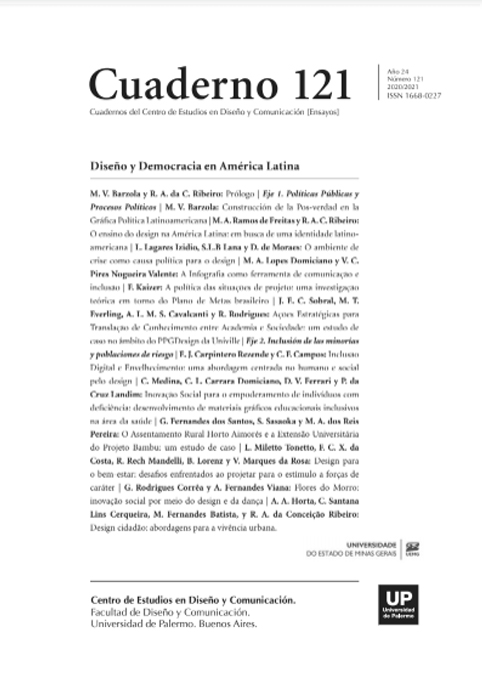O Assentamento Rural Horto Aimorés e a Extensão Universitária do Projeto Bambu: um estudo de caso
Abstract
A rural settlement means a landmark achievement phase because of hard work of social movement efforts in the struggle for possession of a land. Nevertheless, its residents find several difficulties to their structuring and remain in social vulnerability, due to the inequality of access to the rights of citizenship. Under these circumstances, was therefore established a partnership between residents of the Horto de Aimorés rural settlement in Bauru and the university extension of the Projeto Bambu. In the same period, a group of residents formed the Associação Agroecológica Viverde with support from the Grupo Taquara composed of students from the Faculties of Design, Architecture and Engineering of UNESP, Bauru campus. Extension activities with social design-based approach allowed residents for qualification as bamboo artisans. They were benefited by capacitating in technical training workshops held in the bamboo production chain, from the planting of 120 bamboo plants and installation of workshop facilities for product production and construction of structures with focus on social inclusion and income generation. Network opportunities and financial support from competitions allocated the necessary resources in order to initiate required actions. Data collection drew extensively sources of information from bibliographic research, document search and semi-structured interviews. This case study shall reveal the process developed in this university extension in its eleven years of existence. This organisation of the information provided an analysis of the history and the progress made within this contribution of sharing and exchanging experiences between the group Taquara and the associates of Viverde.
References
Abramovay, R. (2000). O capital social dos territórios: repensando o desenvolvimento rural. Economia Aplicada, 2(IV), 379-397.
Bonsiepe, G. (2011). Design, Cultura e Sociedade. São Paulo: Blucher.
Löbach, B. (2011). Design industrial: bases para a configuração dos produtos industriais (Vol. 1). São Paulo: Editora Edgard Blücher Ltda.
Manzini, E. (2009). Viewpoint New design Knowledge. Design Studies, 39(1), 4-12.
Mior, L. C. (2000). A agricultura familiar e o rural não agrícola como estratégia de desenvolvimento rural: algumas controvérsias do debate. In Instituto Federal Rio Grande do Norte. Rio de Janeiro: Sociedade Brasileira de Economia e Sociologia Rural.
Norder, L. A. C. (2004). Políticas de assentamento e localidade. Universidade de Wageningen, Wageningen.
Silva, V. Z. da. (2018, Maio). Os sentidos do design social. Vitruvius Arquitextos, 216(04). Recuperado de http://www.vitruvius.com.br/revistas/read/arquitextos/18.216/6991
Walker, S. (2017). Design for life: creating meaning in a distracted world (Vol. 1). London: Routledge.
Los autores/as que publiquen en esta revista ceden los derechos de autor y de publicación a "Cuadernos del Centro de Estudios de Diseño y Comunicación", Aceptando el registro de su trabajo bajo una licencia de atribución de Creative Commons, que permite a terceros utilizar lo publicado siempre que de el crédito pertinente a los autores y a esta revista.


